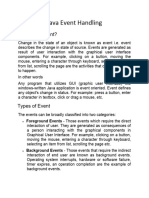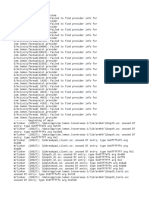Event Handling in Java
Uploaded by
Maanav SingalaEvent Handling in Java
Uploaded by
Maanav SingalaEvent Handling in Java
Event handling in Java refers to the mechanism by which Java applications respond to various
events, such as user actions (e.g., button clicks, mouse movements), system events (e.g.,
window resizing, keyboard input), and other occurrences that require a program's attention.
Java provides a robust event handling framework, primarily based on the Java AWT (Abstract
Window Toolkit) and Swing libraries, to manage and respond to events in graphical user
interfaces (GUIs).
Here are the key components and concepts related to event handling in Java:
1. Event Sources: An event source is an object that generates events. In graphical user
interfaces, common event sources include buttons, text fields, mouse components,
windows, and more. These objects generate events when users interact with them.
2. Event Listeners: An event listener is an object that "listens" to events generated by
event sources. It is responsible for defining the code that should be executed when a
specific event occurs. Event listeners are usually implemented as interfaces in Java.
Some common listener interfaces include ActionListener, MouseListener, KeyListener,
etc.
3. Event Handling Code: Event handling code consists of methods defined by event
listeners. These methods specify how the program should respond when a specific event
occurs. For example, the actionPerformed method in an ActionListener handles button
clicks.
4. Event Registration: Event listeners need to be registered with event sources to receive
and handle events. This is typically done using methods like addActionListener,
addMouseListener, etc., provided by the event source.
• java.awt.event Package: This package contains classes and interfaces for handling AWT
events, which are used in older, heavyweight GUI components. Commonly used classes and
interfaces include:
• ActionEvent: An event generated by components like buttons when they are clicked.
• ActionListener: An interface used for handling ActionEvent.
• MouseEvent: An event generated when the mouse interacts with GUI components.
• MouseListener: An interface for handling mouse events.
• MouseMotionListener: An interface for handling mouse motion events.
• KeyListener: An interface for handling keyboard events.
• WindowListener: An interface for handling window-related events, such as window
closing or resizing.
You might also like
- Event Handling in Java: Components of An Event: Can Be Put Under The Following CategoriesNo ratings yetEvent Handling in Java: Components of An Event: Can Be Put Under The Following Categories8 pages
- BSC 2ndsem Java Lecture 11 Event HandlingNo ratings yetBSC 2ndsem Java Lecture 11 Event Handling91 pages
- Java Study Material Unit IV April - May 2025No ratings yetJava Study Material Unit IV April - May 20257 pages
- Java Events Handling: Delegation Event ModelNo ratings yetJava Events Handling: Delegation Event Model16 pages
- Gui Programming in Java: Tim Mckenna Seneca@YorkNo ratings yetGui Programming in Java: Tim Mckenna Seneca@York16 pages
- Graphical User Interfaces and Event Handling: Abstract Window Toolkit, The Java - Awt and Java - Awt.event PackagesNo ratings yetGraphical User Interfaces and Event Handling: Abstract Window Toolkit, The Java - Awt and Java - Awt.event Packages15 pages
- file_1707213348_0003311_4_eventhandling_updatedNo ratings yetfile_1707213348_0003311_4_eventhandling_updated53 pages
- Basic Programming Using Java Event Handling in AWTNo ratings yetBasic Programming Using Java Event Handling in AWT50 pages
- 2 Laravel E-Commerce Application Development - Initial Project Setup - LaraShoutNo ratings yet2 Laravel E-Commerce Application Development - Initial Project Setup - LaraShout11 pages
- Design patterns explained a new perspective on object oriented design 2. ed Edition Shalloway download pdf100% (9)Design patterns explained a new perspective on object oriented design 2. ed Edition Shalloway download pdf81 pages
- Tutorial Install LAMP Stack On Debian 9No ratings yetTutorial Install LAMP Stack On Debian 914 pages
- Design Principles For Multi Cloud InteroperabilitypdfNo ratings yetDesign Principles For Multi Cloud Interoperabilitypdf11 pages

























































































